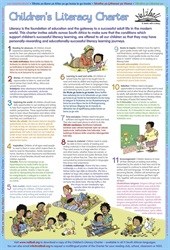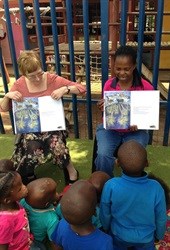Nal'ibali is launching a Charter on Children's Literacy Rights on World Book Day, Wednesday April 23, 2014.
The charter, freely available in all 11 official South African languages as a poster or download, highlights the range of literacy experiences all children should have to enable them to learn to read and write.
It is also a guide for adults, who are their children's first teachers, to do what they can to put the conditions and resources in place to ensure all children have equal access to their right to become fully literate citizens.
The charter comprises 11 rights, based on sound evidence from research, input received from the South African public, fellow literacy organisations and experts and from the children, reading club facilitators and volunteers who attend Nal'ibali Reading Clubs across the country.
Examples of reading rights
• Inspiration: Children of all ages need people to read to them in ways that inspire them to want to read for themselves. Family members at home, teachers in their classroom and librarians at local or school libraries should read aloud to children regularly.• Access to material: Children need to be able to find a variety of reading and writing materials easily in their immediate environment. They need access to a large selection of story, and other books; whether these are owned or borrowed from school and public libraries close enough to where they live. They also need to be surrounded by environmental print in languages they know and understand.
"We hope to place a copy of the charter in every classroom, library, staffroom, office and home," says Carole Bloch, director of PRAESA (the Project for the Study of Alternative Education in South Africa) - a driving partner in the Nal'ibali campaign.
"It's wonderful that we can offer it in all 11 languages. We are asking everyone to read it, discuss it widely and plan how to act on it. The charter outlines the kind of nurturing role we have to rise to as adults to support children into a culture of reading and writing. It's a challenge to join Nal'ibali and get reading and writing, no matter what age you are!" she concludes.
Nationwide distribution
To start the nationwide distribution of the charter and spark collective discussions about what we can do as a nation to put these conditions in place, PRAESA has begun delivering copies to more than 130 reading clubs that form part of the Nal'ibali network of reading clubs across the Eastern Cape, Gauteng, KwaZulu-Natal, the Free State and the Western Cape provinces.
Nal'ibali Cluster Mentors and Story Sparkers driving the campaign on the ground will also be handing out posters at specially planned parent meetings, where community-initiated strategies for supporting the rights in the children's charter will be discussed along with practical ways to deepen community literacy practices in partnership with local stakeholders.
A copy of the charter will also be available in a special edition of the term-time bilingual Nal'ibali reading-for-enjoyment supplement, available from Sunday April 20. The supplement is available in select Times Media newspapers and is published in English-isiXhosa, English-isiZulu, English-Sesotho and English-Afrikaans. Each week, 30,000 copies the supplement are delivered at no cost directly to Nal'ibali reading clubs, as well as fellow literacy NGOs, reading programmes, libraries and Early Childhood Development Centres.
Official launch at Constitutional Hill
The charter will be launched officially at Constitution Hill on April 23 with renowned local storyteller, Chris van Wyk, and human rights activist, Elinor Sisulu, together with 100 children from local schools and their parents. A photographic display will also be held at Constitution Hill from April 23 to May 23, bringing to life the various literacy experiences outlined in the charter.
In addition, to distribute the charter further, partners including Biblionef, National Professional Teacher's Organisation of South Africa (NAPTOSA), LIASA, Van Schaik, the Centre for the Book, SA Booksellers and The Bookery have pledged their support in circulating the poster. Copies will also be distributed at Cape Town Central Library's annual Storytelling Festival on World Book Day to a further 600 children.
Members of the public are encouraged to download a copy of the charter in any language from the Nal'ibali website, www.nalibali.org or email gro.ilabilan@ofni to request a copy.








































